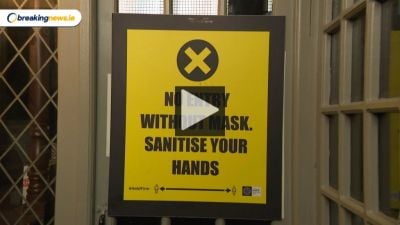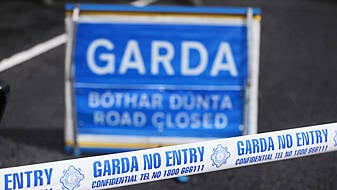A Limerick filling station worker who witnessed the murder of a man in front of her has been awarded damages by a High Court judge.
Theresa Quinn saw Daniel Treacy, a bread delivery man, shot in the head in what is believed to have been a contract killing.
The deli assistant at Topaz, Caherdavin, who thought she was going to die as she hid from the gunman, was awarded €33,ooo for her aggravated post-traumatic stress disorder.
Justice Emily Egan ruled Ms Quinn’s employer acted negligently and in breach of statutory duty in failing to implement its own health and safety protocols and by failing to provide her with a mobile panic alarm.
The judge said Ms Quinn’s “experience was far worse than it would otherwise have been, had she been able to silently and secretly press an alarm and know that help was coming.”
Revenge
In 2013 John Coughlan, a 33-year-old electrician of Pineview Gardens, Moyross, Limerick was jailed for life after being found guilty of the murder of Daniel Treacy, a 36-year-old father of two on February 22nd, 2010.
The trial heard Coughlan shot Mr Treacy out of revenge for the killing of his brother Darren Coughlan who died after a beating in 2005.
A brother of Mr Treacy’s was one of three men convicted in relation to Darren Coughlan’s death.
Footage of a delivery man being shot dead in a filling station 11 years ago was shown to the High Court during the action by Ms Quinn against her employer.
Theresa Quinn (35), formerly of Killeely, Limerick, had taken a case against Topaz Energy Group Ltd claiming psychological injuries arising out of trauma she suffered after witnessing the man being shot three times in the head and once in the groin after the gunman enter the Topaz garage, Cahedavin Limerick on February 22nd, 2010. She claimed she suffered avoidable trauma because she had no safe means of summoning assistance.
Phone calls
Ms Quinn, who was working behind the deli, recalled seeing Coughlan take a gun out of a bag before shooting Mr Treacy. She said she heard a shot, dropped to the floor, crawled into a store room and called the emergency services.
She claimed Topaz had not provided her with a panic button alarm used by other staff members. She said she kept “trying to mute the phone or hang up” so as not to alert Coughlan to where she was, but that the emergency dispatcher kept calling back seeking more details.
“I was thinking this is it, I’m going to die, he’s going to come in here and kill me,” she said in evidence.
In her judgment, Ms Justice Emily Egan found Ms Quinn’s PTSD was “aggravated” due to Topaz’s negligence for the first year to 18 months after the incident.
Ms Justice Egan noted that the woman continues to experience residual symptoms a decade on from the incident and this is a “significant limitation” on her life. The woman is agoraphobic and unable to go to the shops alone, and it is accepted that she is vulnerable to relapse in the future, said the judge.
Left alone
Ms Justice Egan noted that Mr Treacy, the bread delivery man, was known to Ms Quinn. She said Ms Quinn’s colleague vaulted over the counter and left the shop seemingly without activating the panic alarm at his station. Ms Quinn said she was left alone with the assailant, noted the judge, and she could not activate the panic alarm at the till area.
Ms Quinn said she crawled to the cloakroom to access her phone and she heard more shots being fired in the shop, according to the judgment. She said she rang an emergency operator and was afraid the shooter would hear her. She said she repeatedly attempted to mute her phone and she hung up incoming calls from the emergency operator, said the judge.
Ms Quinn said she was afraid the man would find hear the phone and kill her, and she stated in her evidence: “I thought I was going to die”, the judge noted.
Ms Justice Egan found that Topaz’s failure to implement procedures and measures designed to protect the plaintiff represented a breach of its statutory duty of care.
Panic alarm
It was not in dispute that it was Topaz’s policy that employees should wear portable panic alarms, but Topaz maintained that Ms Quinn should have known she should be wearing one and is responsible for any consequences for not having done so, the judge said. Ms Quinn said she had never at any stage been given a panic alarm.
Ms Justice Egan found there was no evidence of staff training on panic alarms and it was “unreasonable” for the defendant to suggest Ms Quinn should have, without prior instruction or permission, taken it upon herself to search for a portable panic alarm in the manager’s office.
Ms Justice Egan found it is a common case that Ms Quinn would have developed PTSD in any event. However, she said the medical evidence says a panic alarm would have resulted in less serious injuries.
Ms Quinn underwent “reasonably extensive treatment”, but it is not apparent that she underwent any in the last several years, the judge went on. This makes it difficult to determine the extent to which the woman’s present and long-term conditions are attributable to actionable aggravation to the original PTSD injury, she said.
Compensation

In assessing compensation of €33,000, of which €3,000 are special damages, Ms Justice Egan noted that the application predates the new personal injuries guidelines, which are intended to reduce damages awards.
Were the plaintiff to be compensated for the “total” psychiatric injuries she has suffered to date and will endure into the future, the judge would have assessed general damages at the level of €100,000.
Ms Justice Egan said she has made no finding that all staff members in every service station, less every in every retail premises, ought to have a portable alarm. She also made no finding that in the event of another security incident an employee will recover damages merely because they can point to measures in their employer’s health and safety statements that were not implemented.
However, she said that in this case there is a “strong connection” between the particular non-implementation the plaintiff complains of and the aggravation of the injury suffered. This case, she said, turns on its own specific facts.







